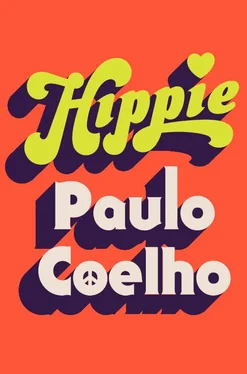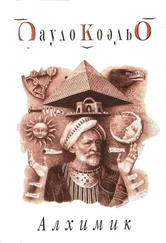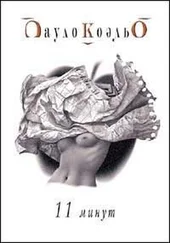Paulo couldn’t possibly have heard the man right. It was much too tempting, that kind of money would allow him to spend two years traveling.
“The only thing we need is that you give us an answer as quickly as possible. Tomorrow, ideally. Please, call this public telephone at four in the afternoon.”
Paulo grabbed the card extended before him; it had a number printed on it, perhaps because they had entered a period of large-scale distribution of goods, perhaps for fear someone might analyze the handwriting.
“I ask that you excuse me, but I need to get back to work. Many thanks for visiting my modest little office. All that I do is allow people to find happiness.”
And with that, the man stood up, opened the door, and Paulo stepped out once again into the room where people lined the walls or lay across dirty mattresses scattered across the floor. He passed by the security guard, who this time gave him a knowing smile.
He walked out into the drizzle, asking God for help, to light the way, to not forsake him at that moment.
He was in a part of the city that was unfamiliar to him, he wasn’t sure how to get back to the city center, he had no map, he had nothing. Of course a taxi would get the job done in an emergency, but he felt the need to walk through the drizzle, which soon transformed into a serious rain that didn’t seem to wash much of anything clean—not the air around him, or his mind barraged with thoughts of those five thousand dollars.
He asked how he could get to Dam Square, but people walked right past him—one more crazy hippie who’d landed here and couldn’t find his people. Finally, a Good Samaritan, a man at a newsstand laying out the next day’s newspapers, sold him a map and showed him where to go.
He arrived back at the hostel, the night watchman lit his special lamp used for seeing if he had that day’s stamp—the guests always received a stamp before leaving, made of some sort of invisible ink. No, he had the previous day’s stamp, he’d just been through twenty-four hours that seemed never to end. He needed to pay for another night, but begged, “Please, don’t stamp me now, I need to take a shower, I need to clean up, I’m dirty in every possible way.”
The doorman consented and asked him to return in no more than a half hour because his shift was ending. Paulo walked into the mixed bathroom, everyone talking loudly, and then returned to his room, grabbed the paper with the telephone number that he’d carried all the way there, went back to the bathroom, already undressed, paper in hand. The first thing he did was to tear it into pieces, soak it so that he could never put it all back together, and then throw it on the floor. Someone complained—that was no place to be throwing things on the floor, he should use a trash can beneath one of the sinks. Others stopped to look at this animal who didn’t know how to take care of the space around him, but he didn’t meet their gaze or explain a thing—he simply obeyed as he hadn’t obeyed anyone in a very long time.
After he did this he got back into the shower and felt reassured; now he was free. Of course, he could always return to the place he’d just come from and get the number again but he knew he would be barred, he’d had his chance and hadn’t taken it.
Which left him feeling very happy.
He lay down on the bed—his demons had gone away, he was certain of it. The demons that expected him to accept their offer and bring them more subjects for their realm. He thought it was ridiculous to think that way—after all, drugs had already been demonized enough—but in this case people were right. It was truly ridiculous—he, who had always defended drugs as a sort of expansion of the consciousness, was now there hoping that Dutch police would put an end to their tolerance of these houses of the rising sun, arrest everybody, and send them far away from those who wanted only peace and love for the world.
He spoke to God, or an angel, because he could not sleep. He walked over to the closet where he’d put his stuff, took the key from his neck, grabbed a notebook where he often scribbled some thoughts and experiences. But he had no intention of reporting everything that Ted had told him—it was unlikely he would write about that in the future. He merely recorded the words that, so he imagined, God had spoken to him:
There is no difference between the sea and the waves
When a wave swells, it is made of water
When it breaks against the sand, it is also made of the same water.
Tell me, Lord: Why are the two things the same? Where do the mystery and the end lie?
The Lord responds: Everything and everybody is the same; this is the mystery and the end.
When Karla arrived, the Brazilian was already there—enormous bags under his eyes, as though he’d spent the entire night without sleeping, or as though…She preferred not to think about the second possibility, as this would imply he was someone she could never trust again, and she’d already grown used to his presence and his scent.
“So, let’s go see a windmill, one of those Dutch icons?”
He slowly got up and began to follow her. They took a bus and eventually left Amsterdam behind them. Karla told him that it was necessary to buy a ticket—there was a machine inside the vehicle—but he preferred to ignore her warning; he’d slept poorly, was tired of everything, and needed to get his energy back. He felt his strength beginning to return.
The landscape was unchanging: immense plains, interrupted by dikes and drawbridges, where barges passed, carrying something somewhere. He couldn’t see windmills in any direction, but it was day and the sun was shining again, provoking Karla to comment on just how rare that was—it was always raining in the Netherlands.
“I wrote something yesterday,” Paulo said, taking a notebook from his pocket and reading aloud. She said neither that she liked it nor that she disliked it.
“Where is the sea?”
“The sea was here. There’s an old proverb: God created the world but the Dutch created the Netherlands. But it’s far from here—we can’t see a windmill and the sea in a single day.”
“No, I don’t want to see the sea. Or even a windmill—something that, I imagine, must captivate tourists. That’s not the kind of trip I’m on, as you must have realized by now.”
“So why didn’t you say anything back there? I’m tired of following the same old route to show my foreign friends something that doesn’t even serve its original purpose anymore. We could have stayed in the city.”
…And gone directly to the spot where they sell bus tickets, she thought. But she left that part out; she had to wait for the right moment to pounce.
—
“I didn’t say anything back there because…”
…The story escaped from his mouth, it was beyond his control.
Karla stood listening, relieved and apprehensive at the same time. Was his reaction not a bit extreme? Was Paulo the type that swung between euphoria and depression and vice versa?
When he was done with his story, he felt better. The girl had listened quietly without judging him. She didn’t seem to think that he had thrown five thousand dollars in the bathroom garbage. She didn’t consider him weak—and that alone made him feel stronger.
They finally made it to the windmill, where a group of tourists was gathered listening to their guide: “the oldest example can be found in [unpronounceable name], the tallest in [unpronounceable name], they were used in the grinding of corn, coffee beans, cacao, the production of oil, and helped our explorers to transform large slats of wood into ships, and as a result, we went far, the empire expanded…”
Читать дальше











